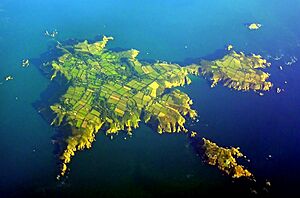Eustace the Monk facts for kids
Eustace the Monk (born Eustace Busket around 1170) was a famous mercenary and pirate from the Middle Ages. He was known for being a bit of an outlaw. Eustace was born near Boulogne, a town in France. His family lived in that area for a long time. He died on August 24, 1217.
Contents
Eustace's Early Life
Eustace was the younger son of Baudoin Busket, a lord from the area of Boulogne. Stories say he traveled to Toledo, Spain, and studied unusual arts there. One writer from Eustace's time said, "No one would believe the amazing things he did."
He later became a Benedictine monk at St Samer Abbey near Calais. But he left the monastery to get revenge for his father's death. Other records show that by 1202, Eustace worked for Renaud de Dammartin, the Count of Boulogne. Around 1204, they had a disagreement. Eustace was accused of mismanaging things, so he ran away and was declared an outlaw. Renaud took Eustace's lands. In return, Eustace supposedly burned down two of Renaud's mills.
Serving England and France
Eustace became a pirate in the English Channel and the Strait of Dover. He worked for himself and as a mercenary for both France and England.
Working for England
From 1205 to 1212, King John of England hired Eustace to fight against Philip II of France. It's said that King John gave him command of thirty ships. During this time, Eustace and his men raided the coast of Normandy. They also set up bases in the Channel Islands. Eustace and his crew held Castle Cornet in Guernsey for a long time. In 1205, he took over the island of Sark. When Eustace raided English villages, King John briefly made him an outlaw. But King John soon pardoned him because he needed Eustace's help.
Switching to France
In 1212, Eustace changed sides. This happened because his enemy, Renaud de Dammartin, became an ally of King John. Renaud supposedly turned King John against Eustace. After this, Eustace raided Folkestone when English troops took his Channel Island bases.
When a civil war started in England in 1215, Eustace supported the rebel barons. He helped Prince Louis of France cross the Channel in 1216 to assist them.
Eustace's Final Battle
In August 1217, Eustace was transporting important reinforcements for Prince Louis. He met an English fleet led by Hubert de Burgh sailing from Dover. In the battle that followed, Eustace fought fiercely against his former allies. The English used powdered lime to blind the French sailors. English troops boarded Eustace's ships and fought his men in hand-to-hand combat.
Eustace, his main ship, and some others managed to escape. But on August 24, 1217, his ship was surrounded in the Battle of Sandwich. This was done by Philip d'Aubigny's English fleet. Eustace was found hiding in the ship's bottom. He offered a lot of money for his life. However, his captors refused because he was so disliked by the English crews. They gave him a choice of where to be executed. He was then beheaded. His brothers survived and continued to hold his Channel Islands base for a while.
Aftermath
In June 1217, during talks for the Treaty of Lambeth, the English demanded that the Channel Islands be returned from Eustace's control. But Eustace was executed while these talks were still happening. So, the negotiations then focused on his brothers. The treaty eventually forced Prince Louis to give up his claim to the English throne. It also made him remove Eustace's brothers from the Channel Islands.
Biography and Stories
A storybook about Eustace was written between 1223 and 1284. It was written by an unknown poet from Picardy, France. This story mainly focuses on his adventures after he left Renaud's service. It tells how Eustace, hiding in a forest, tricked and humiliated Renaud many times. He often used disguises and stole Renaud's horses. This story is similar to medieval myths like Robin Hood.
Images for kids
See also
 In Spanish: Eustaquio el Monje para niños
In Spanish: Eustaquio el Monje para niños
 | Victor J. Glover |
 | Yvonne Cagle |
 | Jeanette Epps |
 | Bernard A. Harris Jr. |




